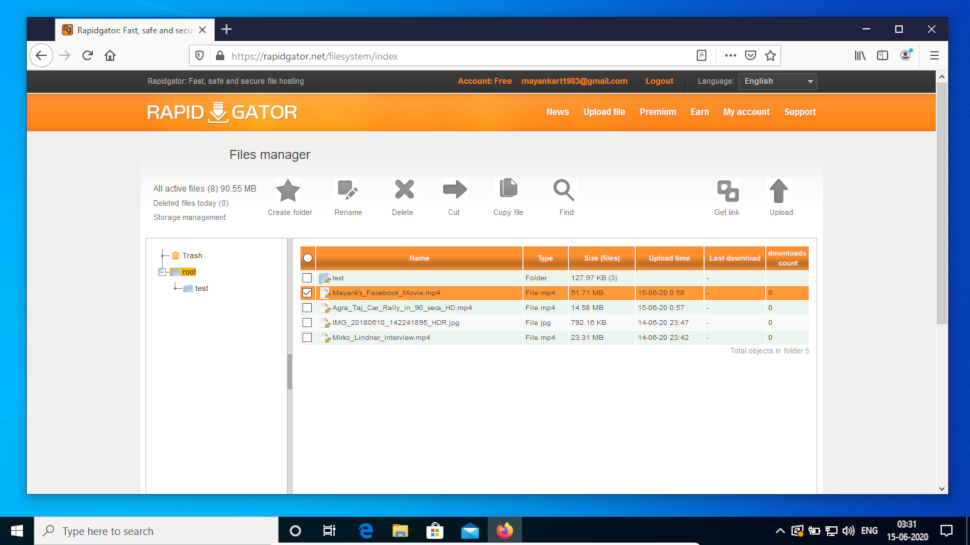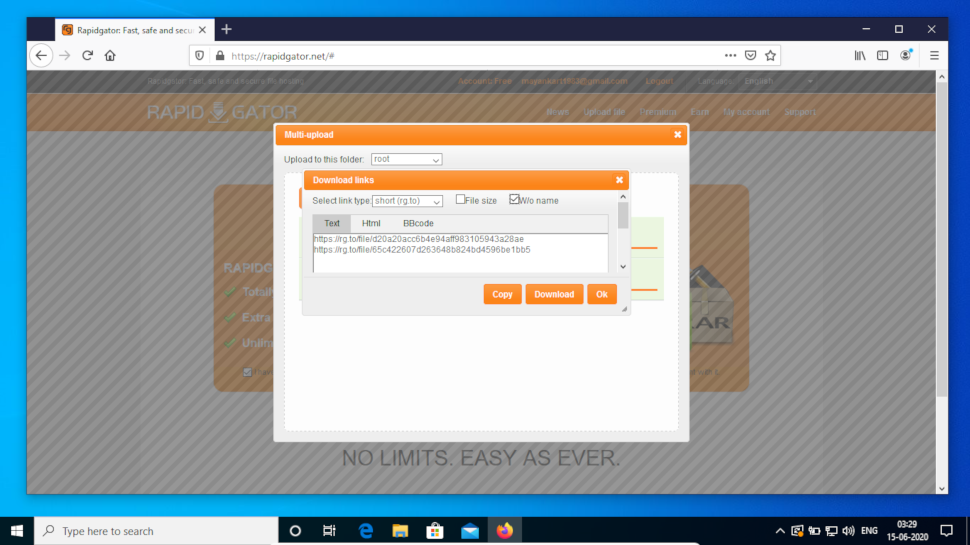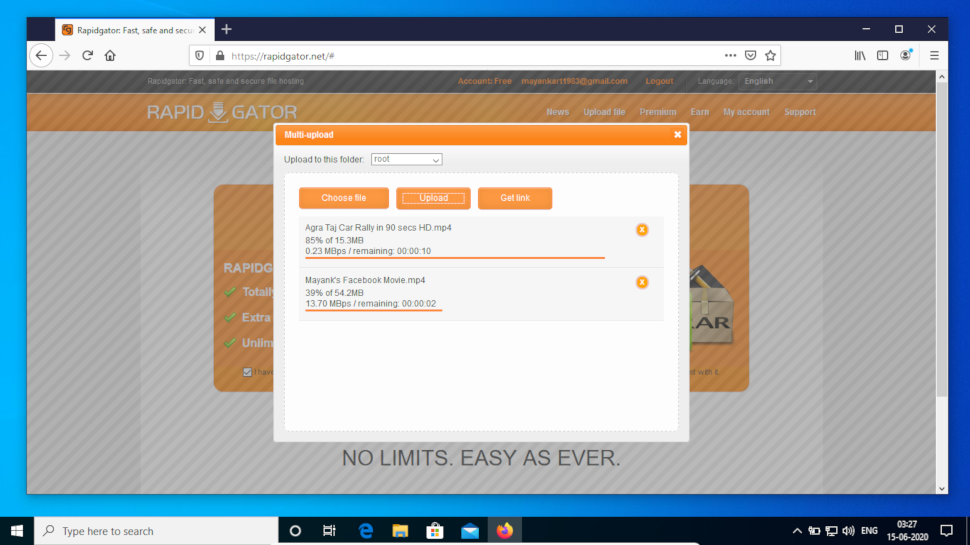TechRadar Verdict
The service makes big claims about generous storage space and bandwidth, but offers little features to back them up. Even those well-advertised characteristics can’t stand the slightest of scrutiny and aren’t all that they seem once you begin peeling the layers.
Pros
- +
Generous bandwidth
- +
Unlimited storage
Cons
- -
No desktop app
- -
No encryption
- -
No password-protection
- -
Severe download restrictions
Why you can trust TechRadar
The Belfast, Ireland based file hosting and sharing service has been operational since 2010. Popular for its bottomless cloud storage policy, Rapidgator claims to have positioned its servers at central internet exchange points to ensure its users get the best possible speeds for uploading and downloading content. While the service seems flawless on paper, the devil is in the details.
Features
For starters, Rapidgator offers unlimited storage space and caps bandwidth usage instead. However, its unlimited storage space comes with a catch in the form of a file deletion policy that isn’t really discriminatory, but rather something to be mindful about. Similarly, its guarantee of unlimited download speeds also comes with a rider -- it’s only available to its Premium subscribers. The Free users get limited speeds and have to deal with several other restrictions as well.
To assist with uploads, Rapidgator supports direct file uploads, FTP uploads as well remote uploads. The browser-based file manager can be used to perform basic file management tasks like creating folders and moving files. Rapidgator also has a very generous file size limit which, at 5 GB per file, exceeds that of most of its peers.
Rapidgator also has a FTP server that you can connect to using a FTP client like FileZilla to upload your files more conveniently. Since the service lacks a dedicated desktop app of its own, we’d ask any potential users to interact with it using a third-party FTP client, instead of the rudimentary web interface. Remember however that all files uploaded via FTP are housed in the root directory in your Rapidgator account.
Rapidgator can also pull in content directly from elsewhere on the internet. You can save your login details for several file sharing services with Rapidgator and then paste the links to bung all your files over to your account.
In terms of downloading, you can pull content from Rapidgator using a download manager. The service also lets you view some statistics to help you track downloads of your shared files.

Interface and apps
Once you’ve registered with the service, you can use the intuitive web uploader to transfer single or multiple files to your Rapidgator account. Oddly, once the files have been uploaded, you have to manually press the ‘Get link’ button to view the sharing links.
The service gives you a couple of options to customize the download links. For instance, instead of the default long URLs you can create short links that use the service’s custom rg.to URL shortening service. You can further make them shorter by removing the file name from the URL. The service will also generate BBcode for pasting the URLs in message boards and you can use the interface to add the size of the file along with the URL as well.
By default the service only has the Root folder, where it will upload all files. You can use the web interface to create more folders and then either move the files inside them or directly upload files into the new folders. Rapidgator enables you to share the URL to complete folders as well instead of individual files. However, while the URL will display the list of the files it houses, you’ll have to download the files individually, which is a real downer.
Downloading a file has a wait time for Free users that increases exponentially for repeat downloads. Essentially, to make best use of the service the downloaders must have Premium accounts as well, which is a rather stringent requirement and somewhat unfair in our opinion.

Plans and Pricing
Like most of its file sharing peers, the service has paid Premium and feature restricted Free accounts. The biggest handicaps for Free users are the download restrictions. Not only do Free users have to wait before downloading the file, they get limited speeds, cannot download more than one file at the same time, and cannot use a download accelerator.
None of these limits are imposed on Premium users who can download files with download managers in multiple threads, and with the option to resume interrupted downloads. Also, the service identifies Premium users using cookies, instead of just their IP address, which enables them to connect to Rapidgator from behind a Proxy server.
Rapidgator has a host of Premium plans that are frankly a little confusing if you don’t understand the service’s deletion policy. While it offers unlimited storage space for owners of Premium accounts, the service will automatically delete those files that haven’t been downloaded for the last 60 days. If you want to retain your files forever, you’ll have to trade the unlimited storage space with a limited storage space.
For instance, the cheapest Premium account costs $14.99/month and gets you 1 TB of transfer bandwidth. With this you can either have unlimited storage where the files will be deleted after 60 days of inactivity. Or, restrict yourself to 3 TB of storage that will never delete your files without your permission. You get similar options for other plans that cost $29.99, $49.99, $69.99 and $99.99 and offer an increasing amount of transfer bandwidth and more permanent storage space.

The competition
Despite its peculiarities, the service might not appear so bad, but it really loses out when compared to its competition. For starters, Rapidgator counts uploads in the allotted bandwidth as well unlike its peers like Sendspace, which only counts downloads. To be fair to Rapidgator however, its bandwidth limits far exceed those offered by Sendspace.
Also, Rapidgator offers no security features. There’s no end-to-end encryption like Mega or even password-protection like Sendspace or Mediafire. Also, unlike services like pCloud and 1fichier, you also can’t preview uploaded files in your Rapidgator account before downloading them.
The service also lacks any desktop tool and even its mobiles apps for Android and iOS are pretty basic and didn’t actually work in our tests! We could use them to browse our files but couldn’t get them to upload files from the Android device to the Rapidgator account, no matter what. A casual glance at the Play Store reviews reveals that this isn’t an anomaly, but a bug that Rapidgator developers have ignored to rectify for quite a while now.
We also aren’t fans of Rapidgator’s download restrictions, which can only be removed by upgrading to a Premium plan. This is in stark contrast to services like Sendspace that don’t impose any download restrictions on Free users downloading files shared by their paid Pro users.
Final Verdict
On the one hand the service feels like it’s designed for use as a personal backup solution. As a premium user, you’ll not be impacted by its download restrictions, and can shuttle your files between your computer and your Rapidgator account without any trouble.
However, the service itself seems to discourage this use with its deletion policy. The Premium accounts that don’t remove the files automatically offer limited storage space, which aren’t much better priced than some of its peers, like 1fichier.
When you add this to the fact that it lacks any functional apps, Rapidgator doesn’t offer enough of an incentive for us to recommend it over its peers.
With almost two decades of writing and reporting on Linux, Mayank Sharma would like everyone to think he’s TechRadar Pro’s expert on the topic. Of course, he’s just as interested in other computing topics, particularly cybersecurity, cloud, containers, and coding.

